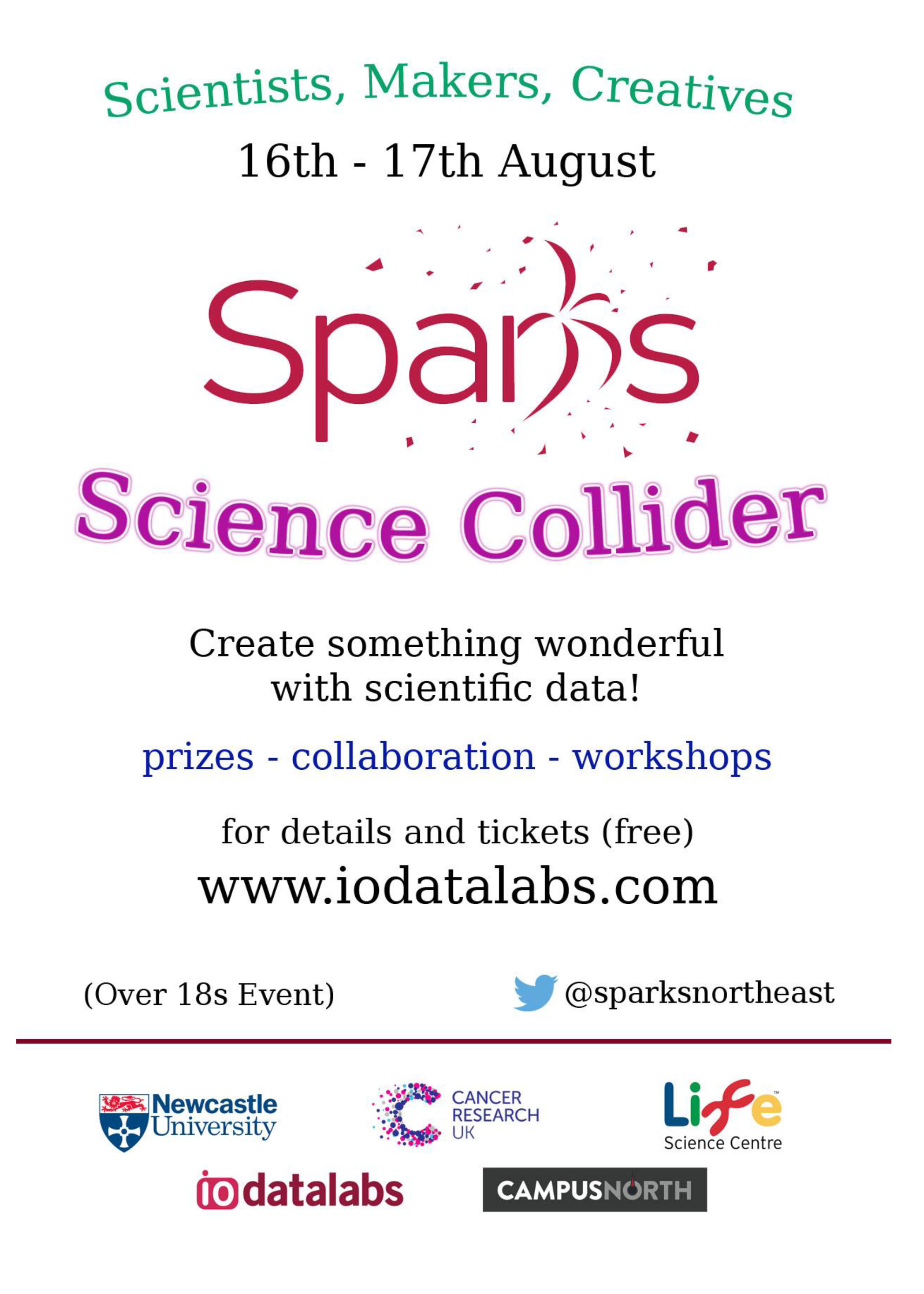What is a Science Collider?
- The Science Collider is a 24 hour hack event during which participants form teams to experiment, improvise, create and play with data.
- We are inviting scientists to bring data, hypotheses, concepts and images, and use these to create exciting, fun and engaging projects for public outreach.
- We want to attract the existing programming and design audience, but also encourage a mix of other disciplines to attend; specifically scientific researchers, statisticians, artists, and makers -to ensure that the projects that emerge from the event are as diverse as possible.
- The aim of the event is to promote the idea of Open Science and to make the research being undertaken in Newcastle more opaque and captivating to the wider community, by presenting it in accessible way. By encouraging attendees to work in a variety of media, we hope there will be something that will appeal to everyone. We are also keen to encourage inter-disciplinary introductions between people for future collaborations.
- Participants will be guided towards the development of a presentable prototype. This might be an app, data interface, interactive data visualisation, poster, physical artwork or game – anything goes, we just want projects to be as creative as possible.
- Previous events have been fun and informal, and although this event is sponsored, all IP is owned by participants.
What will participants get out of attending?
- Discovering new ideas: A hack day incentivises the generation of spontaneous ideas. The limited timescale encourages quick thinking, impulsive problem solving, and working together for inspiration.
- Morale boosting and team work: Participants develop something novel, doing something outside of their normal work. They also get to collaborate with people they may not normally interact with, increasing paths of communication.
- A learning experience: By working together in teams containing members with diverse experience and knowledge, we hope that everyone who participates will leave the event with new skills. By holding lightening talks and mini workshops we hope that participants will be able to learn about the design process from a varied set of experienced professionals. We are also holding workshops and lightning talks.
- A fun and memorable weekend: Hack days are fast paced and fun, with a vibrant and social atmosphere. Although small groups form to work on individual projects, by the end of the event everyone feels like part of one big team. There is a shared sense of achievement in having developed ideas into prototypes in such a short time. The enthusiasm, feedback and prizes make for a very rewarding experience.
Why provide data for the event?
- We’re seeking researchers who would like to contribute science and engineering data for the teams to use as the basis for their projects.
- Data may take any form – tables of numbers, images, narratives, sounds, etc. – we’re seeking variety to inspire people with!
- Some of the most interesting projects arise from mixing data sets together – for example, if your tabulated data contains locations or ages, these can be paired with data from other domains, to augment and explore.
- We’re particularly keen to include as much data as possible relating to our region, and the research done here.
- These collaborations open up possibilities to share tools, knowledge, and ways of thinking – forming new types of project and problem solving. We hope participants will spin your data in a thought-provoking direction. After the event, teams may wish to work with you to continue developing the projects.
- We’ll also be organising an exhibition of the prototypes – to give your research an opportunity for public appreciation.
What we have already
Some of the data we have already include:
- CRUK statistics
- Cancer Research data – images with linked hypothesis and sequencing data
- Time-lapse movies of cell cycle components with related hypothesis
- Quantified health data (data derived from wearable health devices)
Interested?
Please make initial contact as soon as possible, so that we can work with you! We can guide on data format, and work with you to make it accessible for our participants. We’d strongly encourage your attendance at the event, to present the background to your data to the participants, and be available for questions and mentoring (you may, of course, also take part!)
To provide data, contact: Ashleigh.herriott@ncl.ac.uk
To join the mailing list, visit: http://eepurl.com/zlGI1
For tickets, visit: www.iodatalabs.com

